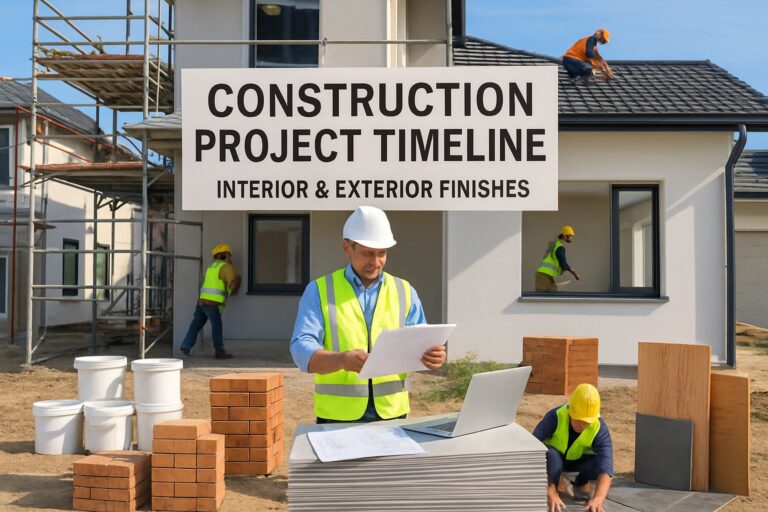How to Choose the Right General Contractor in Toronto: A Comprehensive Guide for Homeowners
Finding the right general contractor for your Toronto home renovation can feel overwhelming. Many homeowners struggle with this decision because it impacts both their property value and daily life during construction. The best approach to selecting a qualified general contractor in Toronto involves checking credentials, getting multiple detailed estimates, and verifying past work through references and completed projects.

When choosing a contractor, it’s important to understand that Toronto’s contracting landscape has unique considerations. Location within the city can affect pricing and availability, with contractors in prime areas often charging premium rates. The tendering process when selecting contractors should be transparent, especially when significant funds are involved.
Key Takeaways
- Verify credentials, insurance coverage, and proper licensing before hiring any general contractor in Toronto.
- Request detailed written estimates from at least three contractors and carefully compare scope, materials, and timelines.
- Protect your investment by ensuring all agreements are properly documented with clear payment schedules and project milestones.
Understanding the Role of a General Contractor
A general contractor serves as the main coordinator for construction projects, taking responsibility for the overall execution, management, and completion of the build. They act as the central point of contact between the client, subcontractors, suppliers, and regulatory authorities.
Key Responsibilities
General contractors oversee the entire construction process from start to finish. They handle project planning, cost estimation, and creating realistic timelines for completion.
The general contractor has the responsibility to manage all subcontractors on site, including electricians, plumbers, and carpenters. They coordinate these various trades to ensure work proceeds in the correct sequence.
Budget management is another crucial task. The contractor monitors expenses, processes payments to subcontractors, and keeps the project within financial constraints.
They also:
- Obtain necessary building permits
- Ensure compliance with local building codes
- Manage quality control throughout construction
- Address any issues that arise during the project
- Maintain site safety protocols
Communication skills are essential as they must regularly update clients on progress and handle any concerns promptly.
How General Contractors Differ From Other Professionals
General contractors differ from specialized trades by having broad knowledge across multiple construction disciplines rather than expertise in just one area. While a plumber focuses solely on water systems, a general contractor understands how all systems integrate within the project.
Unlike architects who focus on design, general contractors implement these designs and handle the practical aspects of construction. They translate blueprints into reality.
Project managers may seem similar, but their role is typically narrower. General contractors not only manage timelines and resources but also take legal responsibility for the project’s execution and often provide their own equipment and labor.
General contractors also differ from construction managers who typically work as the owner’s representative rather than taking on financial risk for the project.
Defining Your Renovation Needs

Before selecting a contractor in Toronto, homeowners must clearly understand what they want to accomplish and how much they can spend. Clear goals and realistic budgets create a solid foundation for successful renovation projects.
Setting Your Project Goals
Start by identifying exactly what you want to change about your home. Are you updating a kitchen, adding a bathroom, or completely renovating an older property? Make a list of must-haves versus nice-to-haves to clarify priorities.
Consider how long you plan to stay in your home. Long-term residents might focus on durability and functionality, while those planning to sell soon should prioritize renovations with strong return on investment.
Think about your daily routines and how the space should function. A family with children might need different features than empty nesters or young professionals.
Collect design inspiration from magazines, websites, and Toronto homes you admire. Creating a vision board helps communicate your aesthetic preferences to potential contractors.
Establishing a Realistic Budget
Research typical costs for similar renovations in Toronto. Home renovation expenses vary widely based on neighborhood, materials, and project scope. Many professionals recommend adding a 15-20% contingency for unexpected issues.
Consider funding options carefully. Will you use savings, a home equity line of credit, or renovation loans? Each option has different implications for your project timeline and total cost.
Be honest about your financial limits when discussing projects with contractors. Good contractors can suggest cost-effective alternatives that maintain quality while reducing expenses.
Remember to factor in permit costs, design fees, and temporary accommodation if needed. These “hidden” expenses can significantly impact your total budget.
Create a spreadsheet with itemized costs to track expenses throughout the project. This organization helps prevent scope creep and keeps your renovation on budget.
Researching General Contractors in Toronto
Thorough research is essential when selecting a general contractor for your Toronto construction project. Proper investigation helps you find reliable professionals who can deliver quality work within your budget and timeframe.
Checking References and Reviews
Start by asking contractors for references from past clients in Toronto. Contact these references directly to learn about their experiences. Ask specific questions about project completion time, budget adherence, and communication quality.
Online reviews provide valuable insights into a contractor’s reputation. Check platforms like Google Business, HomeStars, and the Better Business Bureau. Pay attention to how the general contractor responds to negative reviews, as this reveals their professionalism.
Verify credentials through the Toronto Construction Association or Ontario General Contractors Association. Ensure they hold proper licenses and insurance coverage for working in Toronto.
Red flags to watch for:
- Multiple complaints about the same issue
- Unresolved disputes
- Poor communication mentioned repeatedly
- History of abandoned projects
Evaluating Experience With Similar Projects
Look for contractors with proven experience in projects similar to yours. A contractor who specializes in commercial renovations might not be ideal for your residential addition.
Request a portfolio of completed work in the Toronto area. Photos, videos, and case studies help assess quality and style compatibility. Many Toronto-based contractors showcase their projects online or have physical portfolios.
Ask detailed questions about their approach to projects like yours:
- What challenges did they face on similar projects?
- How did they solve unexpected problems?
- What subcontractors do they typically work with?
Experience with Toronto’s building codes and permit processes is crucial. Local knowledge helps navigate city-specific regulations efficiently, preventing delays and compliance issues.
Evaluating Qualifications and Credentials

Checking a contractor’s qualifications helps you avoid costly mistakes and ensures quality work. Toronto contractors need specific credentials to operate legally and demonstrate their expertise.
Licensing and Insurance Requirements
All general contractors in Toronto must have proper licensing through the City of Toronto. Ask to see their business license and verify it’s current. The contractor should also carry multiple insurance policies:
- Liability insurance (minimum $2 million coverage)
- Worker’s compensation insurance
- Property damage insurance
Don’t hesitate to call the insurance company to verify the policy is active. Proper credentials protect you from liability if accidents happen on your property.
Contractors should also have permits for specific jobs like electrical, plumbing, or structural work. Reputable contractors will handle the permit process and ensure all work passes city inspections.
Professional Affiliations and Certifications
Quality contractors typically belong to professional organizations that maintain industry standards. Look for memberships in:
- Toronto Construction Association
- Building Industry and Land Development Association (BILD)
- RenoMark
- Canadian Home Builders’ Association
These affiliations show commitment to industry best practices and continuing education.
Certifications matter too. Some valuable credentials include:
- Red Seal trade certification
- Project Management Professional (PMP)
- LEED certification for green building
- Specific manufacturer certifications for products they install
Ask about these during interviews. Most qualified contractors will proudly display their credentials on business cards, websites, and in their offices.
Comparing Estimates and Proposals
A thorough evaluation of estimates and proposals from different general contractors is crucial for making an informed decision. Examining the detailed breakdown of costs and identifying potential hidden charges helps homeowners avoid budget overruns during construction projects.
Understanding Quote Breakdown
Professional general contractors provide detailed estimates that itemize all projected costs. These breakdowns typically include materials, labor, equipment, and timeline projections for each phase of work.
When comparing multiple proposals, look for consistent formatting across estimates to make meaningful comparisons. Well-structured estimates include:
- Materials: Types, quantities, and quality grades
- Labor costs: Hourly rates and projected hours
- Permits and fees: All regulatory costs
- Project timeline: Start date, completion date, and key milestones
Request clarification on any vague line items. Contractors should be willing to explain their pricing structure and justify higher costs if premium materials or specialized labor are involved.
Identifying Hidden Costs
Even detailed proposals may contain potential cost escalations that aren’t immediately obvious. Robust estimates should address potential variables that might affect the final price.
Common hidden costs in contracts include:
- Allowances: Budgeted amounts for unselected fixtures or finishes that may prove insufficient
- Contingency fees: Percentages added for unforeseen circumstances
- Change order provisions: How modifications to original plans are priced
Compare how different contractors handle risk in their cost structures. Contractors who offer fixed-price contracts versus time-and-materials billing have different approaches to financial risk.
Ask about escalation clauses that might trigger additional costs. Reputable general contractors will transparently discuss these scenarios rather than hiding potential increases in the fine print.
Contract Negotiation and Documentation

Once you’ve found a promising general contractor in Toronto, the contract phase becomes crucial. Clear agreements protect both parties and set expectations for the project ahead.
Key Elements of a Construction Contract
A well-drafted construction contract should include detailed project specifications, scope of work, and quality standards. This documentation prevents misunderstandings and serves as reference throughout the project.
The contract must clearly outline:
- Project scope – exact work to be completed
- Materials specifications – brands, grades, and quality standards
- Change order process – how modifications will be handled
- Dispute resolution procedures – steps to resolve disagreements
- Warranty information – what’s covered and for how long
Toronto contractors typically use standard industry contracts, but don’t hesitate to negotiate terms that protect your interests.
Review all documents carefully before signing. Consider having a construction lawyer review complex contracts to identify potential issues.
Establishing Payment Terms and Timelines
Payment structure directly impacts project success and should be carefully negotiated with your contractor. Avoid contractors who demand large upfront payments.
A typical payment schedule includes:
Progress Payments Timeline:
- 10-15% deposit upon signing
- 25-30% at rough-in completion
- 25-30% at drywall completion
- 25-30% near project completion
- 5-10% final payment (held for 30-45 days after completion)
Always tie payments to completed milestones rather than calendar dates. This incentivizes timely progress.
The contract should include a detailed project timeline with specific completion dates for each phase. Clarify what constitutes project completion and the conditions for final payment.
Ensuring Effective Communication and Project Management

Good communication and strong project management are crucial elements when working with a general contractor in Toronto. These factors can make the difference between a smooth renovation and a stressful experience.
Clarifying Roles and Responsibilities
A successful home renovation starts with clearly defined roles. The general contractor should provide a detailed contract that outlines who handles what aspects of the project. This document should specify decision-making authority and communication chains.
Ask for a responsibility matrix that shows:
- Which team members oversee specific tasks
- Who approves material selections
- Who manages subcontractors
- Contact information for key personnel
Regular meetings help maintain alignment throughout the project. Effective communication should flow both ways, with the contractor providing updates and the homeowner raising concerns promptly.
Professional contractors establish preferred communication channels early. Some use project management software, while others prefer text messages or emails for daily updates and in-person meetings for major decisions.
Tracking Progress and Handling Changes
Reputable general contractors implement robust tracking systems to monitor project timelines and budgets. Request a detailed project schedule with key milestones before work begins.
The best contractors provide:
- Weekly progress reports with photos
- Updated timelines reflecting any delays
- Budget tracking documents showing expenses versus estimates
- Documentation of any changes to the original plan
Change orders are common in home renovations. Establish a formal process for handling modifications to avoid misunderstandings and cost disputes. This process should include written approval requirements and clear pricing for any additional work.
Weather delays, supply chain issues, and unexpected structural problems can affect timelines. A quality contractor anticipates potential challenges and creates contingency plans. They communicate these adjustments clearly rather than making promises they cannot keep.
Frequently Asked Questions

Finding the right general contractor in Toronto involves careful consideration of multiple factors including qualifications, reputation, and compatibility with your specific project needs. These questions address the most common concerns homeowners have when hiring construction professionals in the Greater Toronto Area.
What factors should I consider when selecting a general contractor for a renovation project in Toronto?
Experience with similar projects should be a top priority when selecting a contractor. Contractors who have completed work similar to your renovation will better understand the specific challenges involved.
Budget alignment is crucial, as different contracting methods affect pricing structures. Ensure the contractor’s typical project size matches your renovation scale.
Communication style and availability matter significantly. The contractor should be responsive and able to explain complex concepts clearly.
Local knowledge of Toronto building codes and permit requirements can prevent costly delays. Contractors familiar with neighborhood-specific regulations offer valuable expertise.
What are the signs of a reputable general contractor in the Toronto area?
Proper licensing and insurance are non-negotiable indicators of legitimacy. Reputable contractors in the Greater Toronto Area will readily provide proof of both.
Detailed, written quotes demonstrate professionalism and transparency. Be wary of contractors who provide only verbal estimates or vague pricing.
Strong references from previous clients in Toronto neighborhoods similar to yours indicate consistent quality work. Ask for at least three recent references.
Clean contracts with clear timelines, payment schedules, and change order procedures show business acumen and organization. Ambiguous contracts often lead to disputes.
How can I verify the licensing and qualifications of a general contractor in Ontario?
The Ontario College of Trades maintains a public registry of licensed tradespeople. Homeowners can search this database to verify a contractor’s qualifications and standing.
Building permits require proper licensing, so contractors should have a valid Business License from the City of Toronto and appropriate trade licenses.
Professional association memberships such as the Toronto Construction Association or the Ontario General Contractors Association indicate industry engagement and commitment to standards.
Insurance verification is essential – request certificates for liability insurance and Workers’ Compensation coverage directly from their insurance provider.
What is an appropriate budget range for hiring a general contractor in Toronto?
Labor costs in Toronto typically account for 30-40% of total project costs. Current market rates for skilled trade labor range from $45-$85 per hour depending on specialization.
Management fees usually fall between 10-20% of the total project cost. Projects with greater complexity or tight timelines may command higher percentages.
Material markup varies but generally ranges from 15-25% above wholesale costs. Toronto construction industry competitiveness affects these rates seasonally.
Budget buffers of 15-20% should be maintained for unexpected issues. Toronto’s aging housing infrastructure often reveals hidden problems during renovations.
How do I assess the quality of past work completed by a Toronto general contractor?
In-person site visits to completed projects provide the most accurate assessment. Request to see projects similar to yours that were completed within the last two years.
Photo documentation throughout project phases demonstrates attention to detail. Quality contractors document not just finished spaces but also in-wall and structural work.
Client testimonials specifically mentioning timeline adherence and budget management offer valuable insights. Look for comments about how challenges were handled.
Warranty fulfillment history shows long-term commitment to quality. Ask previous clients if the contractor promptly addressed any issues that arose after project completion.
What questions should I ask a general contractor before commencing a construction project in Toronto?
Project timeline expectations should be clearly established. Ask about potential seasonal impacts and how the contractor schedules trade sequences.
Subcontractor relationships matter – inquire about which work will be subcontracted and how those partnerships are managed. Established contractors have reliable trade networks.
Change order procedures should be understood in advance. Qualifications-based selection processes can help identify contractors with fair change management practices.
Payment schedule terms must be reasonable for both parties. Standard practices include deposits, progress payments tied to milestones, and holdbacks as required by Ontario law.








